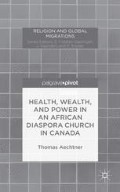Abstract
Abstract
A pronounced concern with the utility of Pentecostal beliefs and practices emerges as a central theme in the analysis of APCC. After briefly examining functionalism and religion, this chapter provides a summary typology of APCC’s apparent functions, including Corporate Utility; Religio-Cultural Appeal and Preservation; Reality Maintenance; Identity Formation; Socioeconomic Action; and, Coping Mechanisms. Following this review, the chapter then concludes by noting congregant opinions regarding the future of APCC. Some members envisaged that many people from outside of the diaspora will eventually join the church, while others were skeptical of APCC’s appeal to non-Africans. Nonetheless, despite these varied outlooks, parishioners unanimously declared that the church will, in some way, positively influence Canadian society with its non-Western form of Pentecostalism.
Access this chapter
Tax calculation will be finalised at checkout
Purchases are for personal use only
Preview
Unable to display preview. Download preview PDF.
Notes
Boris Nieswand, “Charismatic Christianity in the Context of Migration: Social Status, the Experience of Migration and the Construction of Selves among Ghanaian Migrants in Berlin,” in Religion in the Context of African Migration, ed. Afe Adogame and Cordula Weissköppel (Bayreuth: Eckhard Breitinger, 2005), 255–256.
Peter L. Berger, “Some Second Thoughts on Substantive Versus Functional Definitions of Religion,” Journal for the Scientific Study of Religion, 13:2 (1974): 127.
Karl Marx, Critique of Hegel’s “Philosophy of Right,” trans. Annette Jolin and Joseph O’Malley (Cambridge: Cambridge University Press, 1970 [1843]), 131.
Sigmund Freud, The Future of an Illusion, trans. Gregory C. Richter (Peterborough: Broadview Press, 2012 [1927]), 92.
Emile Durkheim, The Elementary Forms of Religious Life, trans. Karen E. Fields (New York: Free Press, 1995 [1912]).
Robert Mapes Anderson, Vision of the Disinherited: The Making of American Pentecostalism (New York: Oxford University Press, 1979), 15.
Rebecca P. Bomann, Faith in the Barrios: The Pentecostal Poor in Bogotá (Boulder: Lynne Rienner, 1990), 37, 39.
Author information
Authors and Affiliations
Copyright information
© 2015 Thomas Aechtner
About this chapter
Cite this chapter
Aechtner, T. (2015). The Spirit’s Utility: Expressed Functionalism and APCC’s Future. In: Health, Wealth, and Power in an African Diaspora Church in Canada. Religion and Global Migrations. Palgrave Macmillan, New York. https://doi.org/10.1057/9781137485496_5
Download citation
DOI: https://doi.org/10.1057/9781137485496_5
Publisher Name: Palgrave Macmillan, New York
Print ISBN: 978-1-349-50371-1
Online ISBN: 978-1-137-48549-6
eBook Packages: Palgrave Religion & Philosophy CollectionPhilosophy and Religion (R0)

